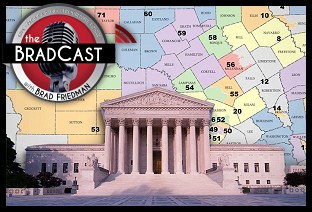 As a former Republican, I can't help noticing the dark irony in the abandonment of rogue Nevada rancher Cliven Bundy by Republican politicians and right-wing media figures on the heels of his incendiary comments last week about "the Negro."
As a former Republican, I can't help noticing the dark irony in the abandonment of rogue Nevada rancher Cliven Bundy by Republican politicians and right-wing media figures on the heels of his incendiary comments last week about "the Negro."
Bigotry is never funny, as Los Angeles Clippers owner --- and (contrary to right-wing media misinformation) registered Republican --- Donald Sterling has proven. However, one can't help chuckling over the fact that right-wingers tried to wash their hands of Cliven the Cretinous just a few days after they celebrated a US Supreme Court ruling limiting affirmative-action efforts in higher education.
The two issues are connected, though not in the way one might think...
Younger readers of The BRAD BLOG may not be aware of just how contentious the issue of affirmative action was in the 1990s. While strong criticism --- from right-wingers and even some "centrists" --- of federal efforts to ameliorate past discrimination against non-whites was prominent in the 1970s and 1980s, it reached a fever pitch in the early 1990s, after the release of Shelby Steele's anti-affirmative action book The Content of Our Character and affirmative-action opponent Clarence Thomas's nomination to the US Supreme Court. The growing backlash against affirmative action consumed the GOP, outliers such as Colin Powell notwithstanding. Numerous legislative and court challenges to public-sector affirmative-action programs cropped up in the mid-1990s, many of which were supported by right-wing ideologues and interest groups; future Rep. Darrell Issa (R-CA) was one of the "funding fathers" of the anti-affirmative-action Proposition 209 ballot initiative in California in 1996.
As a young conservative Republican, I was fully in favor of these anti-affirmative action efforts. At the time, I agreed wholeheartedly with Steele and his punditry pals Thomas Sowell and Jeff Jacoby that "quotas, set-asides and racial preferences" worsened racial tensions, filling working-class whites with resentment and filling people of color with defensiveness. I applauded when the late Boston talk-radio host David Brudnoy denounced affirmative action as "active retribution" against whites. In addition, I wrote numerous letters to the editor denouncing defenders of affirmative-action policies, one of which was published in the New York Times in 1997, just before my 20th birthday.
Five years later, when then-Senator Trent Lott (R-MS) praised the segregationist campaign of 1948 third-party Presidential candidate and Senate colleague Strom Thurmond (R-NC), I was mortified; by spouting off, Lott had compromised the conservative case for colorblindness. Lott's praise of Thurmond's racist campaign set back the anti-affirmative-action cause, giving the impression that the political allies of affirmative-action opponents wanted to turn the clock back to the Jim Crow past, instead of moving forward to a truly colorblind future. I was not the only one to notice this problem: Abigail Thernstrom, then a fellow at the Koch Brothers-funded Manhattan Institute and the co-author of the controversial 1997 book America in Black and White: One Nation, Indivisible, denounced Lott's remarks in a December 2002 New York Times piece, strongly implying that Lott's loose language would make it harder for Republicans to make a moral case against affirmative-action and in favor of private school vouchers.
I can't imagine Thernstrom being pleased by the right-wing's recent bonding with Bundy. (She certainly wasn't pleased by the right's obsession with the New Black Panther Party four years ago.) However, her 2002 logic certainly applies to 2014. How can the right proclaim a commitment to colorblindness one moment, and buddy up to Bundy, George Zimmerman and Donald Trump the next?
While the late Representative Jack Kemp (R-NY) had a number of flaws --- climate-change denial among them --- he at least understood that the GOP had to have some degree of credibility on racial issues in order to, you know, talk about them. Indeed, in a syndicated column written just a few months before his May 2009 passing, Kemp declared: "The party of Lincoln, (i.e., the GOP), needs to rethink and revisit its historic roots as a party of emancipation, liberation, civil rights and equality of opportunity for all." Instead of doing so, of course, the party decided to embrace "birtherism," voter suppression, and extremists such as Bundy.
The right's self-created credibility issues aren't going away anytime soon. Set aside race for a second, and ask yourself this: didn't the right condemn then-Senator Barack Obama six years ago for supposedly "palling around" with a domestic radical who denounced the government? Didn't the right condemn President Obama five years ago for allegedly besmirching the integrity of law enforcement?
Let's hope that Obamacare covers treatment for short-term memory loss.
D.R. Tucker is a Massachusetts-based freelance writer and a former contributor to the conservative website Human Events Online. He has also written for the Huffington Post, the Boston Herald, the Boston Globe, ClimateCrocks.com, FrumForum.com, the Ripon Forum, Truth-Out.org, TheNextRight.com, and BookerRising.com. In addition, he hosted a Blog Talk Radio program, The Notes, from August 2009 to June, 2010. You can follow him on Twitter here: @DRTucker.


 SCOTUS Ruling a How-To for Unlawful Gerrymandering on 'Eve' of Critical Election Year: BradCast' 12/17/25
SCOTUS Ruling a How-To for Unlawful Gerrymandering on 'Eve' of Critical Election Year: BradCast' 12/17/25 Bricks in the Wall:
Bricks in the Wall: 'Green News Report' 12/16/25
'Green News Report' 12/16/25
 'This One Goes to 11': Weekend of Violence, Tragic Murder of Rob Reiner: 'BradCast' 12/15
'This One Goes to 11': Weekend of Violence, Tragic Murder of Rob Reiner: 'BradCast' 12/15 Sunday 'WTF?' Toons
Sunday 'WTF?' Toons Trump Now Losing One
Trump Now Losing One 'Green News Report' 12/11/25
'Green News Report' 12/11/25 Dems Continue Stunning 2025 Election Streak: 'BradCast' 12/10/25
Dems Continue Stunning 2025 Election Streak: 'BradCast' 12/10/25 Petrostates and Propagandists Undermining Climate Science: 'BradCast' 12/9/25
Petrostates and Propagandists Undermining Climate Science: 'BradCast' 12/9/25 'Green News Report' 12/9/25
'Green News Report' 12/9/25 The High Cost of Trump's Terrible Policy Making: 'BradCast' 12/8/25
The High Cost of Trump's Terrible Policy Making: 'BradCast' 12/8/25 Sunday 'All in a Day's Work' Toons
Sunday 'All in a Day's Work' Toons Dems Fight to Avoid the GOP's Massive, Year-End Health Care Cliff: 'BradCast' 12/4/25
Dems Fight to Avoid the GOP's Massive, Year-End Health Care Cliff: 'BradCast' 12/4/25 'Green News Report' 12/4/25
'Green News Report' 12/4/25 A 'Flashing Red Warning Sign' for GOP: 'BradCast' 12/3/25
A 'Flashing Red Warning Sign' for GOP: 'BradCast' 12/3/25 Hegseth, War Crimes and DoD's 'Politicization Death Spiral': 'BradCast' 12/2/25
Hegseth, War Crimes and DoD's 'Politicization Death Spiral': 'BradCast' 12/2/25 Follow the
Follow the  With Thanks, No Kings and Good Cheer
With Thanks, No Kings and Good Cheer Presidential Illegality and Duty to Disobey
Presidential Illegality and Duty to Disobey President of United States Calls for Killing Democratic Officials: 'BradCast' 11/20/25
President of United States Calls for Killing Democratic Officials: 'BradCast' 11/20/25 Is MAGA Finally Beginning to Fall Apart?: 'BradCast' 11/19/25
Is MAGA Finally Beginning to Fall Apart?: 'BradCast' 11/19/25 Trump's Terrible, Horrible, No Good, Very Bad Week: 'BradCast' 11/18/25
Trump's Terrible, Horrible, No Good, Very Bad Week: 'BradCast' 11/18/25
 VA GOP VOTER REG FRAUDSTER OFF HOOK
VA GOP VOTER REG FRAUDSTER OFF HOOK Criminal GOP Voter Registration Fraud Probe Expanding in VA
Criminal GOP Voter Registration Fraud Probe Expanding in VA DOJ PROBE SOUGHT AFTER VA ARREST
DOJ PROBE SOUGHT AFTER VA ARREST Arrest in VA: GOP Voter Reg Scandal Widens
Arrest in VA: GOP Voter Reg Scandal Widens ALL TOGETHER: ROVE, SPROUL, KOCHS, RNC
ALL TOGETHER: ROVE, SPROUL, KOCHS, RNC LATimes: RNC's 'Fired' Sproul Working for Repubs in 'as Many as 30 States'
LATimes: RNC's 'Fired' Sproul Working for Repubs in 'as Many as 30 States' 'Fired' Sproul Group 'Cloned', Still Working for Republicans in At Least 10 States
'Fired' Sproul Group 'Cloned', Still Working for Republicans in At Least 10 States FINALLY: FOX ON GOP REG FRAUD SCANDAL
FINALLY: FOX ON GOP REG FRAUD SCANDAL COLORADO FOLLOWS FLORIDA WITH GOP CRIMINAL INVESTIGATION
COLORADO FOLLOWS FLORIDA WITH GOP CRIMINAL INVESTIGATION CRIMINAL PROBE LAUNCHED INTO GOP VOTER REGISTRATION FRAUD SCANDAL IN FL
CRIMINAL PROBE LAUNCHED INTO GOP VOTER REGISTRATION FRAUD SCANDAL IN FL Brad Breaks PA Photo ID & GOP Registration Fraud Scandal News on Hartmann TV
Brad Breaks PA Photo ID & GOP Registration Fraud Scandal News on Hartmann TV  CAUGHT ON TAPE: COORDINATED NATIONWIDE GOP VOTER REG SCAM
CAUGHT ON TAPE: COORDINATED NATIONWIDE GOP VOTER REG SCAM CRIMINAL ELECTION FRAUD COMPLAINT FILED AGAINST GOP 'FRAUD' FIRM
CRIMINAL ELECTION FRAUD COMPLAINT FILED AGAINST GOP 'FRAUD' FIRM RICK SCOTT GETS ROLLED IN GOP REGISTRATION FRAUD SCANDAL
RICK SCOTT GETS ROLLED IN GOP REGISTRATION FRAUD SCANDAL VIDEO: Brad Breaks GOP Reg Fraud Scandal on Hartmann TV
VIDEO: Brad Breaks GOP Reg Fraud Scandal on Hartmann TV RNC FIRES NATIONAL VOTER REGISTRATION FIRM FOR FRAUD
RNC FIRES NATIONAL VOTER REGISTRATION FIRM FOR FRAUD EXCLUSIVE: Intvw w/ FL Official Who First Discovered GOP Reg Fraud
EXCLUSIVE: Intvw w/ FL Official Who First Discovered GOP Reg Fraud GOP REGISTRATION FRAUD FOUND IN FL
GOP REGISTRATION FRAUD FOUND IN FL

































